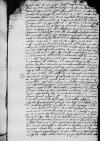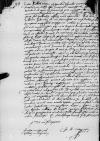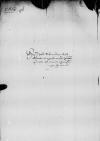Letter #1877
Ioannes DANTISCUS to Tiedemann GIESEHeilsberg (Lidzbark Warmiński), 1538-07-23
English register:
Dantiscus informs that he has received a package of letters sealed by Giese from the hands of “the Italian deceiver” (sycophanta Italus) [Vicentz Walch]. He is critical about the news that Giese, persuaded by “another deceiver” [Wojciech Kijewski], paid the first one the excessive sum of 25 ducats for delivering the package [containing the confirmation bulls for Dantiscus and Giese, and letters to them from Cracow]. As Georg Hegel has informed Dantiscus, that messenger took the package from the Fuggers in Venice and refused to hand it over to Hegel in Cracow after the latter offered him three ducats in payment, hoping to get more from the addressees.
[Kijewski], who is behind this unpleasant incident, is trying with all his might to regain his lost favour with the Queen [Bona Sforza]. Dantiscus has read and is sending back [Kijewski’s] letter to Giese – he thinks it has been very cleverly worded. He himself paid the messenger 10 zlotys, which is the amount he owed, while Giese – as had previously been agreed – should not have paid anything for the package.
During Dantiscus’ latest stay in Cracow [June 27 — July 2, 1538] [Kijewski] politely entertained him to dinner, as if he had never been disloyal to him. Dantiscus displayed Christian self-restraint and tolerance towards him.
Enclosed with the letter from Samuel [Maciejowski] which Dantiscus received was a royal document concerning transferring the administration of the bishopric of Pomerania to Giese.
Responding to Giese’s doubts regarding the settlement of accounts with the Fuggers, for his information Dantiscus sends the bill and the letter he received from Georg Hegel. If Giese still has doubts, Dantiscus will send for an explanation to Cracow. He thinks, however, that since they have finally received their bulls, there is no sense in complaining further about the delay.
One of the bulls received contains the text of the oath that Dantiscus should take before the Bishop of Courland or Giese [as the Bishop of Kulm (Chełmno)] – Dantiscus deems it necessary to meet with Giese on the matter. Dantiscus will be happy to help Giese in connection with his consecration.
Dantiscus and Achatius von Zehmen (Achacy Cema) have completed the task they were given and the King [Sigismund I] has promised that he will make sure the old privileges of the Prussian ius indigenatus are observed, and that he will also try to convince his son [Sigismund II Augustus] to do the same. Samuel [Maciejowski] has left the matter of the Thorn (Toruń) articles unresolved in anticipation of Dantiscus’ opinion about the ban on entrusting castles (with the exception of Marienburg (Malbork)) to Poles. Dantiscus will soon clarify the matter.
Dantiscus sends Giese the King’s decision regarding [Anna] Wachsschlagerin (Woszczkowa). He plans to discuss the details when they talk.
When staying in Wrocław (Breslau), Dantiscus discussed the matter of the canonry with [Ioannes] Rupoldus – he does not want to resign in exchange for uncertain promises and is coming to Ermland (Warmia) soon. Dantiscus heard the same from Doctor Jan Benedyktowicz [Solfa], but he does not know what their true intentions are.
After the harvest Dantiscus plans to visit the cathedral [in Frauenburg (Frombork)].
Manuscript sources:
Prints:
| ||||||||
Text & apparatus & commentary Plain text Text & commentary Text & apparatus
Reverendissimo Domino
Reverendissime Domine, frater et amice carissime atque honorande.
Sa[lutem] [et] fraterni amoris commendationem.
Accepi a
Reverendus dominus
Quod Dominatio Vestra Reverendissima
Quod si Dominatio Vestra Reverendissima, cum fasciculum aperuit, hanc schedam legisset, fortassis in calculo non haesitaret, quoque clarius possit rimari omnia, mitto et eius ad me cf.
Inter bullas inveni obsignatum plumbo iuram[entum] [quod]
De con[ficiendo] munere consecrationis, si quid in usum Dominationis Vestrae Reverendissimae poss[em], [ut] prius sum pollicitus, offero meam operulam. Res domino
Negotium confirmationis articulorum
In causa
Dominationi Vestrae Reverendissimae in hoc suo episcopatu multam et longam precor felicitatem. Eandemque in prosperrima diuturnitate faustissime valere cupio summopere.
Ex
Reverendissimae Dominationis Vestrae frater integerrimus
Postscript:
Finita messe ad ecclesiam[7] me conferam etc.
[1 ] Cf. the letter from
[2 ] Cf. the letter of Tiedemann Giese to Ioannes Dantiscus,
[3 ] Cf. the letter from
[4 ] A list of expenses enclosed to the
[5 ] Dantiscus did not attend the
[6 ] In the letter sent from the
[7 ] ecclesia means here the cathedral church in


